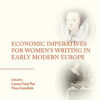
De communicerende vaten van Oscar van Leer. Ondernemerschap en filantropie in de Van Leer Entiteit, 1958-1986.
Oscar van Leer was de jongste zoon van de schatrijke industrieel Bernard van Leer (‘de Vatenman’). Na het overlijden van zijn vader zette hij diens werk voort, niet alleen als leider van het door Bernard opgebouwde vaten- en verpakkingsconcern, maar ook als bestuursvoorzitter van diens filantropische Bernard van Leer Foundation, die zich richt op voorschools…
Lees meer
Kunstenaars protesteren tegen cultuurbezuinigingen tijdens de Schreeuw om Cultuur
Dit artikel is onderdeel van het themanummer Het literair klimaat 2010-2019, onder redactie van Laurens Ham en Sven Vitse. Aan de hand van tien gebeurtenissen in de jaren 2010 – chronologisch verbonden aan telkens één van de tien jaren van het decennium – wordt in dat nummer een beeld geschetst van de veranderende literaire cultuur…
Lees meer
Economic Imperatives for Women’s Writing in Early Modern Europe
Economic Imperatives for Women’s Writing in Early Modern Europe delves into the early modern history of women’s authorship and literary production in Europe taking a material turn. The case studies included in the volume represent women writers from various European countries and comparatively reflect the nuances of their participation in a burgeoning commercial market for authors…
Lees meer
Duitse keurvorst betaalt Nederlandse dichteres
In 1654 verschijnt voor het eerst een Nederlandstalige gedrukte poëziebundel van de hand van een vrouw waarin religieuze onderwerpen níét de boventoon voeren. Dat is echter niet de enige reden waarom de bundel interesse wekt. De Dordtse Maria Margaretha van Akerlaecken (1605-na 1662) verkeerde financieel in zwaar weer en zocht met Den Cleefschen Pegasus steun…
Lees meer
Geld blijft tijd: over de rol van schrijvers in het literatuurbeleid
‘Geld is tijd’, schreef J.C. Bloem ooit: zodra schrijvers wat geld hebben, hebben ze even financiële ruimte om met literair werk aan de slag te gaan. Tientallen Nederlandse schrijvers gebruikten deze uitspraak als motto toen ze in de winter van 1962-1963 tegen hun beroerde sociaal-economische positie protesteerden. Ze weigerden literaire prijzen en dreigden de aanstaande…
Lees meer
Scriptie: De kunstcollectie van Baccio Valori (1535-1606), patriciër en mecenas in het Florence van de Medici
Deze scriptie betreft de kunstverzameling van Florentijnse patriciër Baccio Valori de Jongere (1535-1606). Zijn familie was in 1537 door een conflict met de heersende Medici-dynastie in een moeilijke positie gekomen en had al haar eer verloren. Desondanks wist Baccio zich alsnog te ontwikkelen tot een geleerd man met een groot netwerk. Geleidelijk herwon hij het…
Lees meer
The Phenomenon of the Married Woman Writer in the Dutch Republic
In this blog post, Nina Geerdink makes a startling discovery. Even though it has often been noted that many Dutch women stopped writing once married, she finds that there was a sizable group of women who did continue or even start writing after getting married. Here, she shows that their motivations for writing were complex but often related to…
Lees meer
La gloria della famiglia Salviati: Het kunstmecenaat van de Salviati in Florence tijdens de heerschappij van de Medici
During the fifteenth and sixteenth century the Salviati family was one of many patrician families that shaped the city of Florence and its surroundings. The Salviati were also actively displaying their wealth, by initiating expensive and conspicuous projects: artists painted large fresco-cycles in their palazzi, decorated their villa’s and chapels, and designed their gardens. Moreover,…
Lees meer
Reciprocal interactions and complex negotiations: three nineteenth-century models of patronage
This article suggests that patronage relationships can be interpreted in terms of gift exchange, arguing that this pertains in particular to late nineteenth-century forms of patronage.
Lees meer
‘My intention is just to entertain you a little’. The patronage relationship between Edward Gordon Craig and Marguerite Caetani.
‘My intention is just to entertain you a little’. This is what stage designer and theatre reformer Edward Gordon Craig wrote to Marguerite Caetani in an undated letter. Between 1917 and 1925, Craig wrote her dozens of letters, first from Rome, where he lived, and later from Rapallo. For him, the contact with this rich…
Lees meer
